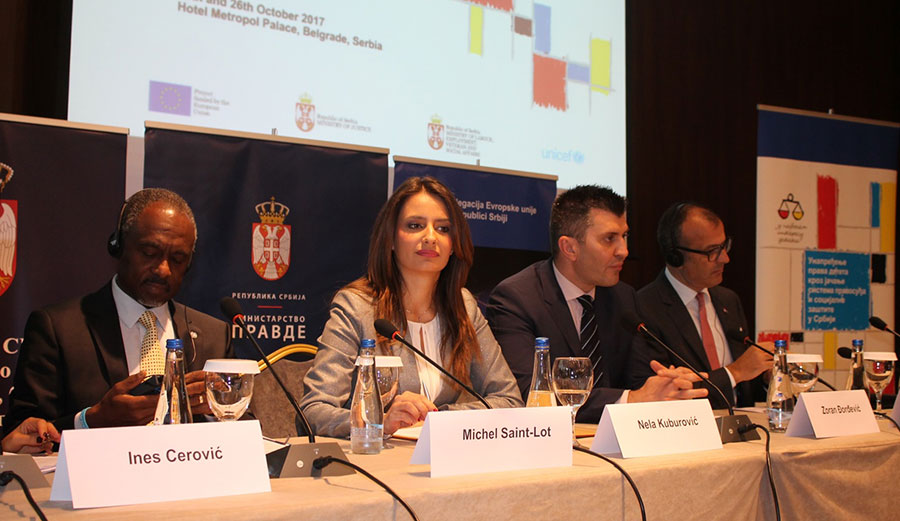A two-day conference to present the activities and results of the “Advancing the Child Rights through Strengthening of Judicial and Social Welfare Systems in Serbia” project started today in Belgrade. The project is implemented by UNICEF, in partnership with the Ministry of Justice and the Ministry of Labour, Employment, Veteran and Social Affairs of the Republic of Serbia, with financial support of the European Union.
Justice Minister Nela Kuburovic said that numerous activities of the project were a part and parcel of chapter 23 Action Plan, specifically the segment dealing with children’s rights, including child-friendly justice.
Kuburovic said that the project was focused on efficient application of diversion orders and non-institutional educational measures in order to strengthen personal responsibility of juvenile offenders and influence their re-socialisation.
Presenting the results made in four cities included in the project, Minister said that the number of pronounced diversion orders showed a steady growth. In 2009, courts issued 211 diversion orders, whereas in 2016 the number rose to 1032, with over a thousand children referred to various intervention programmes aimed at re-socialisation and reintegration.
Minister of Labour, Employment, Veteran and Social Affairs Zoran Djrodjevic said Serbia was consistently applying provisions of the 1989 Convention of the Rights of the Child. He said that the line Ministry was working to support children in the social protection system, adding that it could not and must not remain unresponsive to any case which includes a child in conflict with the law, either as a victim or a witness. He said the authorities were obliged to mobilise their capacity and urge centres for social work to work to prevent and curb alarming tendencies.
Head of the EU Delegation to Serbia Sem Fabrizi said that “making the justice system more child-friendly in Europe is a significant action under the EU Agenda.“
“We strongly promote the implementation of the 2010 Council of Europe Guidelines on Child-friendly Justice and take them into account in future legal instruments when children in justice system are concerned. These guidelines are an important practical tool for Member States in the process of adjusting their judicial systems,” EU Ambassador said.
He said that the EU was supporting Serbian efforts in judiciary in a very concrete manner. “Through our pre-accession instrument referred to as IPA. The EU institutions’ financial assistance alone to Serbia amounts to around EUR200 million annually. A considerable amount is dedicated to the justice sector – over EUR30 million to this area alone over the next two years,” Fabrizi said and added that Serbian efforts to improve observance of children’s rights were “an opportunity that opens avenues to ensure that children genuinely become full-fledged citizens, respected and protected in their individuality, human dignity, evolving capacities and potential to enhance democratic institutions and inclusive societies.”
“Childhood is here and now,” said Michel Saint-Lot, Director of UNICEF Serbia. “We must therefore do everything to make the justice and social welfare systems work in the best interest of the child. Serbia has become a good practice example when it comes to working with children who have committed offences or when judicial bodies need to interview children who have been victims of a crime.”
The two-day conference, dedicated to advancing the rights of the child through strengthening of justice and social welfare systems, allows an exchange of experience and lessons learnt in the area of application of diversion orders to juvenile offenders, protection of child victims in judicial proceedings, advancing of children’s rights in civil proceedings and enhancing the capacity of providers of free legal aid.




